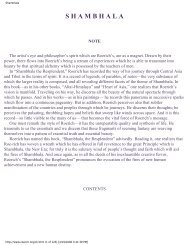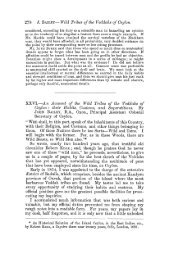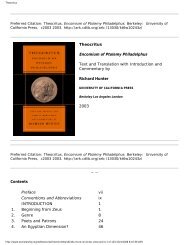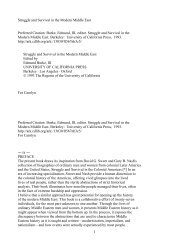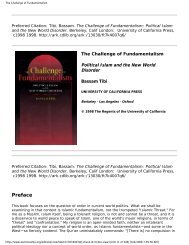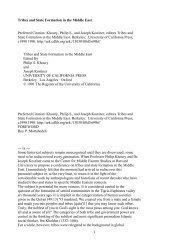Between Two Worlds Kafadar.pdf
Between Two Worlds Kafadar.pdf
Between Two Worlds Kafadar.pdf
Create successful ePaper yourself
Turn your PDF publications into a flip-book with our unique Google optimized e-Paper software.
Christianity. The Danismendname , as we saw in the last chapter, captured the<br />
urgency of this in two of its major characters for whom the crossing occurred in<br />
such haste, after a sudden flash of enlightenment, that neither one of them had<br />
time to change his or her name, overtaken by the joy of having found the right<br />
side and too eager to join the fight for its supremacy.<br />
The sociopolitical order created by these frontier conditions developed a<br />
general reluctance to recognize an aristocracy, a freezing of inheritable<br />
distinction in specific lineages, even after settling down. A system like the<br />
devshirme , whereby children of non-Muslim peasant families were recruited,<br />
"Ottomanized," and then brought to the highest positions of government, could be<br />
conceivable only in a state born of those frontier conditions.<br />
The potentialities of mobility and fluidity found their ultimate representation<br />
and congealed into "awe-inspiring centrality" (i.e., charisma) in the persons of<br />
the babas, religions mystical leaders of the tribal and (newly settled?) peasant<br />
populations, who could change into birds or, slipping into things more<br />
ferocious, lions or whatever they wished to be and fly or roar over vast spaces<br />
unleashing their arsenal of alchemical weaponry. The most illustrious example is<br />
of course the Haci Bektas of later legend, who was sent from Khorasan to<br />
Anatolia in the form of a dove and turned out to be the baba of babas. The<br />
Ottomans also relied on the services of many of these babas and cultivated and<br />
patronized them in the earlier stages of their state building. Eventually,<br />
however, the more established and urbane Sufi orders were preferred by the<br />
Ottoman state while some of the earlier allies became opponents. The Safavids<br />
were able to gain followers among not only the tribes but also some of the<br />
closely related groups of dervishes who were ready to adopt Shi'ism. The ahi<br />
bands, on the other hand, the guild-like quasi-Sufi associations of men in urban<br />
areas, including the small towns around and later within the Ottoman<br />
principality, lost their once considerable autonomy as they were turned into<br />
guilds much more strictly controlled by the government.<br />
Another social group that suffered from the centralization of power in the<br />
growing Ottoman polity and the eventual adoption of an imperial<br />
― 142 ―<br />
mode of administrative and intellectual life was that of the frontier warriors,<br />
led by the begs of the uc. Given the paucity of sources, it is impossible to<br />
pinpoint precisely the early tensions that manifested themselves between the<br />
House of Osman and its allies and warriors. Such tensions are naturally built<br />
into any political structure, and the example of `Ali Amourios from the first<br />
few years of the fourteenth century again comes to mind as an early falling out<br />
between Osman and one of his fellow warriors. Some of Osman's early allies were<br />
his Bithynian Christian neighbors, many of whom found themselves incorporated if<br />
not eliminated. As the power of Osman and Orhan grew and as their principality<br />
began to acquire the characteristics of a sedentary administration, there must<br />
have been gazis and others within that principality who felt left out. That<br />
there was opposition among the neighboring warriors is dear from the rivalries<br />
the Ottomans faced. A much deeper, structural tension emerged among the gazis,<br />
who were accustomed to seeing themselves as partners of the begs of the House of<br />
124




